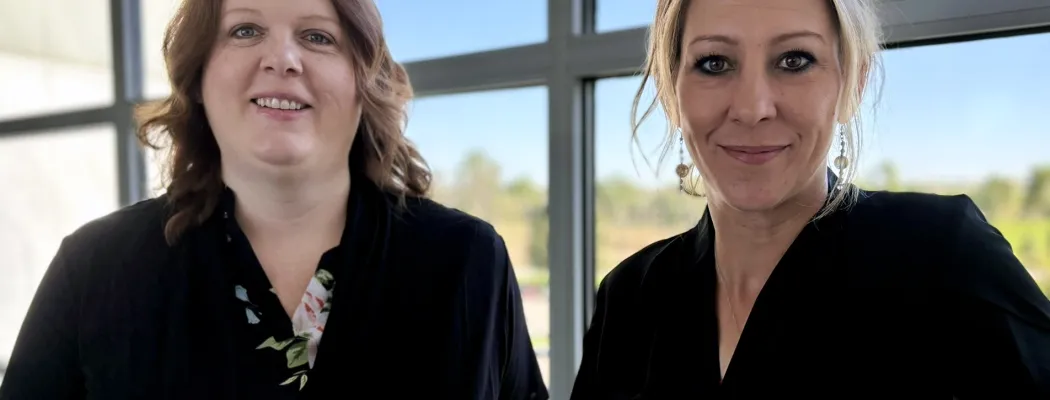
Regional West Sees Improved Patient Safety through Falls and Wound Care Initiatives
Over the past year and a half, Regional West’s Falls Committee has reported consistently lower acute care fall rates, and the Skin Champions team has significantly reduced hospital-acquired pressure injuries. Now, these groups look to build on their successes and continue to make strides toward better patient safety.
Acute Rehab Unit Nurse Manager Liz Stephen, MBA, RN, joined Accreditation Coordinator Julie Focken, BSN, RN, as co-chair on Regional West’s Falls Committee last year. As co-chairs, Stephen and Focken take a deep look into each reported fall to review the investigation that was done, determine the underlying causes, and discuss what improvements need to be made throughout the hospital to lower fall risks. When the pair joined forces, they looked at existing processes and found ways to better communicate their findings, such as the online tool they developed for nursing leadership to share data and identify fall trends.
Front-line employees also play a key role in decreasing falls. Focken and Stephen knew it was important to include them in Falls Committee meetings to get feedback on ideas, share what’s working, and discuss what can be done differently.
“Nursing leadership can sit in a room and talk about these ideas, but we need the frontline employee perspective so they can tell us what challenges they face, and what the actual issues are,” Stephen said.
Additionally, Focken and Stephen have seen great improvement from implementing enhanced meaningful rounding. When nurses complete their hourly rounding on patients, they center around the four P’s of fall prevention: pain, position, potty, and possessions. They’ve also put an increased focus on early mobility.
“Hourly rounding has always been an expectation, but last year we added specific documentation requirements so that we can better track it and improve patient safety,” said Focken.
These tactics have also gone hand-in-hand with reducing hospital-acquired pressure injury rates, which are the focus of the Skin Champion team. Pressure injuries are described in stages from I to IV, with each stage representing increased severity. Over the past year, Regional West has significantly reduced stage III or stage IV hospital-acquired pressure injury rates.
Recently, the group partnered with Medline, a medical supply company, and received new skincare supplies and education tools to help provide a better understanding of wound care and prevention. These tools are shared throughout the facility to educate both clinical and non-clinical employees.
The team has also implemented a four eye, 14-point skin assessment for all patients who are at risk of developing pressure injuries. Each shift, two nurses round on these patients and check the 14 points of the body that are prone to developing wounds.
Aside from the addition of 60 new inpatient beds earlier this year, perhaps the biggest shift has come from dedicating two wound nurses to inpatient care. These nurses work closely with surgeons, providers, floor nurses, and support employees to provide expertise in wound care. On Tuesdays, they attend Interdisciplinary Team (IDT) meetings to identify patients who are at risk of developing pressure injuries, and on Wednesdays they visit these patients to check their surfaces, make sure they’re being turned appropriately, and place orders to care for their specific wound needs.
Stephen said their consistent presence has been beneficial for employees on the floors, too.
“Instead of splitting their time between the clinic and the floor, they are dedicated to inpatient wound nursing and have helped our employees become well-versed in skin injury prevention,” she said. “They have an office here, and our employees know exactly who to turn to if they need help.”
With the facility’s upcoming transition to the Epic electronic medical record system in October, Focken and Stephen plan to see more positive changes in both falls and wound care. Documentation from across disciplines, such as therapy notes and provider charting, will feed into a system that will provide a more personalized fall risk assessment for each patient. As the patient progresses through their stay and further information is added, their fall risk will adjust accordingly. The same will go for pressure injury assessments.
Chief Quality Officer Margo Ferguson, MT, MSOM, CPHQ, said the Fall Committee and Skin Champion team’s efforts are critical to improving the patient experience.
“Part of quality and patient safety is learning from adverse events to prevent them from recurrence,” she said. “These committees do important work by digging into these incidents to make positive change.”
Though they have plans to expand and improve their teams, Focken and Stephen take pride in the progress they’ve made.
“We are proud of the impact we’re having on patient care,” Stephen said.
[photo cutline: Accreditation Coordinator Julie Focken, BSN, RN, and Acute Rehab Unit Nurse Manager Liz Stephen, MBA, RN.]